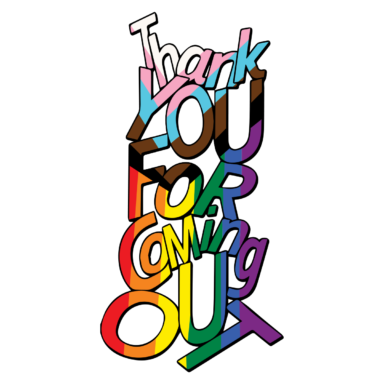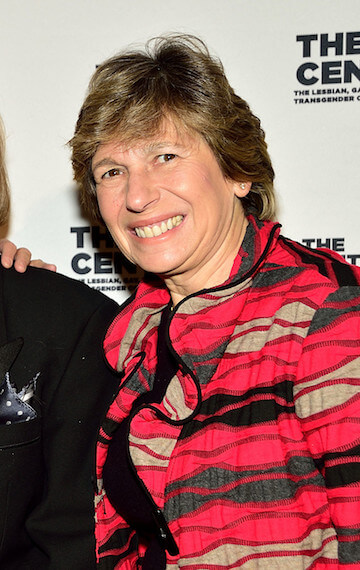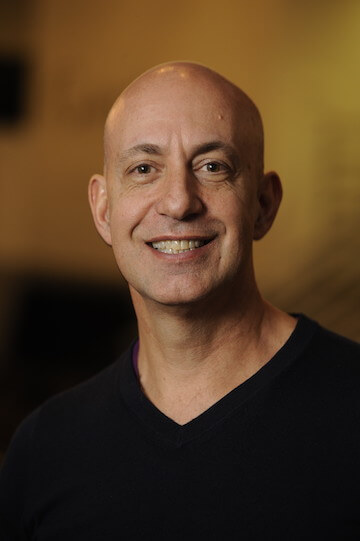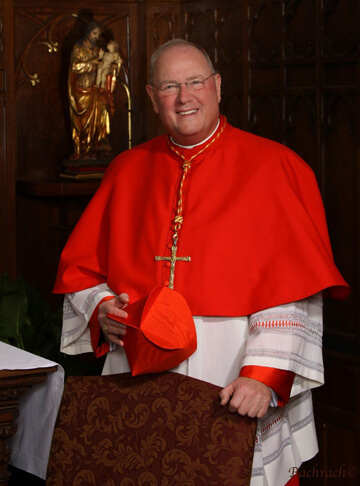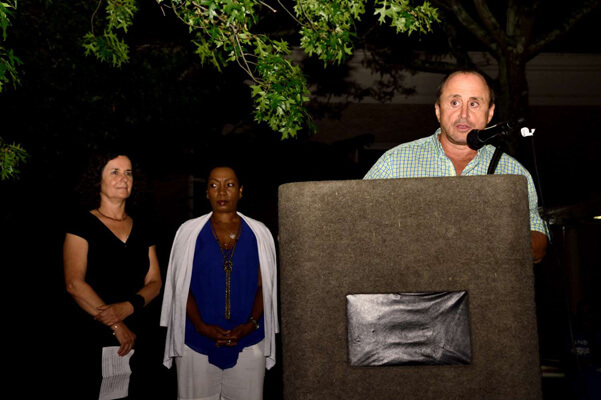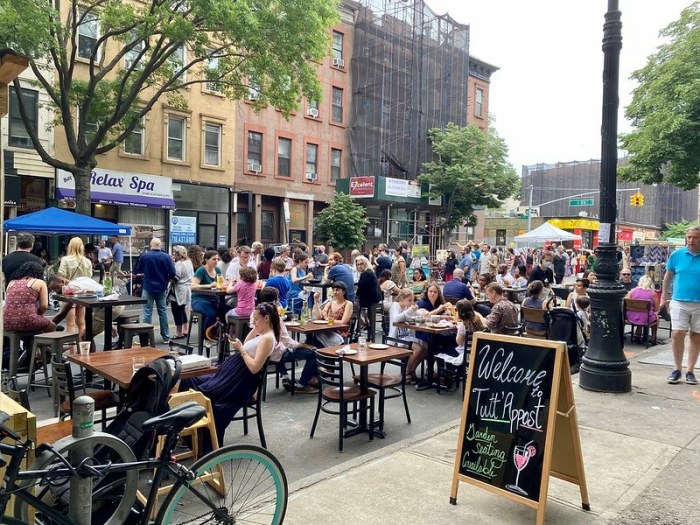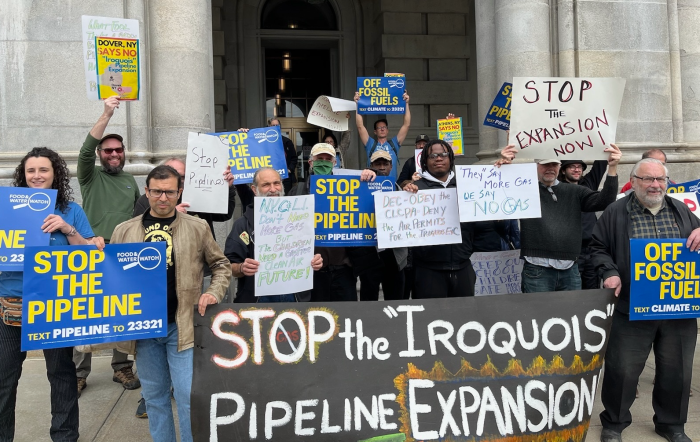Ed Koch with former Miss America Bess Myerson, his constant “companion” during his first race for mayor. | MUNICIPAL ARCHIVES OF THE CITY OF NEW YORK
Ed Koch, New York’s mayor from 1978 through 1989, a period of enormous change for the LGBT movement, including the beginning and some of the worst years of the AIDS crisis, died on February 1 of congestive heart failure.
He was 88 years old and died without ever publicly acknowledging his homosexuality. And his inaction during the crucial early years of the AIDS pandemic –– which emerged in 1981 on his watch –– has never been forgiven by large numbers of gay men and others who lost so many loved ones and friends to the virus.
His life and record as a public official have been reported in great detail in the wake of his death, and he has drawn praise from many –– including some former enemies –– for embodying and even “saving” his city, but his record on LGBT issues, which was mixed, and his response to AIDS, which was deplorable, has received notably short shrift.
While some in the gay community, including his friend Charles Kaiser, a journalist and author, have offered a defense of Koch’s silence on his sexual orientation, the verdict among many, many AIDS activists on the former mayor’s record on addressing the epidemic has been decisive and harsh.
“Ding dong, the wicked witch is dead,” wrote Larry Kramer, the co-founder of Gay Men’s Health Crisis and ACT UP, in an email. “He was not kind to us.”
The 2011 Tony Award-winning revival of Kramer’s 1985 “The Normal Heart” about the terrifying early days of the AIDS crisis reminded a new generation about Koch’s miserable record on the epidemic.
Kramer recently wrote, “What is this evil man up to as he approaches his death? We must never forget that this man was an active participant in helping us to die, in murdering us. Call it what you will, that is what Edward Koch was, a murderer of his very own people. There is no way to avoid knowing that now. The facts have long since been there staring us in the face. If we don't see them, then we are as complicit as he.”
A combative and divisive figure who won three terms as mayor after a career in the New York City Council and the US Congress representing the East Side, Koch began as a pioneering ally of the LGBT community; he was among the earliest vocal supporters of gay rights on the national scene and courted the increasingly assertive lesbian and gay electorate in his winning 1977 mayoral campaign. Three years earlier, he had been one of the initial co-sponsors of the federal gay and lesbian rights bill in Congress, along with his Manhattan Democratic colleague Bella Abzug.
On his first day in office on January 1, 1978, Koch delivered on a campaign promise to issue an executive order banning discrimination on the basis of sexual orientation in municipal employment. He appointed Henry Geldzahler as his commissioner of Cultural Affairs, only the second out gay city commissioner after Bob Livingston, named to the Human Rights Commission by Koch’s predecessor, Abe Beame. And Koch appointed a mayoral liaison to the gay community, Herb Rickman, an out gay man. Perversely, Rickman was also made liaison to the Orthodox Jewish community.
But despite this start, Koch quickly fell into a fractious relationship with LGBT activists, who were then part of a militant grassroots movement that had exploded after Stonewall and not yet drifted into the institutional, top-down politics of today. It soon became evident he was not going to deliver on pledges to use his political muscle to get the city gay rights bill passed, though he did testify for it at hearing after hearing in the City Council.
Allen Roskoff, a Gay Activist Alliance member who came up with the idea of a bill banning discrimination based on sexual orientation in 1971 –– the first such effort in the nation –– recalled, “In late 1977, when we believed we could have had the bill passed under the lame duck administration of Abe Beame, Ed Koch, through his surrogate John LoCicero, told us that Koch insisted that not happen and he guaranteed passage within the first six months of the Koch administration.
“Koch called a meeting of gay leaders six months later and reneged on his commitment. He decided that any Council member who based their objection to the bill on religious grounds had no personal obligation to him to vote for the bill. He and his administration declared as enemies any gay activist who tried to pressure him and his administration to secure passage of the bill. He belittled leaders of our community with his acid tongue and the bill languished until 1986. Like Roy Cohn, he was a self-serving, closeted homosexual who did a great deal of damage to the gay community and people with AIDS. Unlike Christine Quinn, I do not mourn his death.”
The City Council speaker engineered the recent naming of the Queensborough Bridge for Koch and had his endorsement in her current run for mayor. In her release after his death, Quinn, an out lesbian, made no mention of Koch’s record on LGBT or AIDS issues, but said, “I can remember seeing him on TV when I was a little girl and thinking to myself, ‘If I could ever meet him it would be a dream come true.’ Years later when I was working at the Anti-Violence Project, I was in the midst of a very public battle with City Hall. Mayor Koch called me out of the blue. I had never spoken to him in my life. He told me, ‘You’re doing the right thing. Don’t back down, and call me if I can do anything.’”
An ACT UP poster.
Koch and the AIDS Crisis When the gay community, in 1981, called on Koch to do something about the emergence of what came to be called AIDS, they were stonewalled. It took 21 months for Gay Men’s Health Crisis to get a meeting with the mayor –– a meeting for which Kramer agitated hardest, but from which he was excluded, at the same time being removed from GMHC’s board of directors. At one of the early GMHC AIDS Walks in the late 1980s where Koch spoke, Kramer stood alone at the front of the crowd with a big sign bearing an ugly picture of Koch that read: “Ed Koch: The Worst.”
Koch –– at the epicenter of the crisis –– refused to deal with AIDS as the public health emergency that it was in the same way that Legionnaires’ Disease, for example, had been five years earlier when it struck members of the American Legion attending a convention in a Philadelphia hotel.
To be sure, President Ronald Reagan’s federal response was even worse, and the New York Times, after running one brief story in July 1981, ignored the crisis for more than a year after that.
But Koch was in a position to do something as mayor and, for a variety of reasons, downplayed the crisis and did not do what was needed to inform the public and begin prevention efforts. All of those early efforts had to be spearheaded by the gay community itself at a time when it was barely organized and had few resources. Early efforts at community self-help saved many lives, but the virus –– not identified until late 1983 –– spiraled out of control and resulted in the ongoing worldwide pandemic in which as many as 70 million people have been infected and almost 35 million have died.
Needle exchange for injecting drug users was assiduously resisted by the Koch administration, leading to thousands of unnecessary HIV infections. Even Britain under conservative Maggie Thatcher embraced needle exchange early on and virtually contained that end of the epidemic. And public education commenced there almost immediately, with an informational brochure to every household about what was known.
Hospital overcrowding was so acute in New York in the mid to late ‘80s due to the decommissioning of beds that people with AIDS were often consigned to gurneys in hallways rather than getting the care they needed. Many people with HIV-related illnesses were shunned in city hospitals, their food left at the door by fearful health care workers.
Reid Pillifant wrote on the Capital New York blog, “One of the few peeks into Koch's psyche comes from a former adviser, who says Koch was very worried someone would interrupt an AIDS forum (hosted by the New York Post, for the record), and accuse him of being gay. After the forum, Koch complains of a headache and suffers a stroke, making for just one of the many crises in his third term,” his final one, which ran from 1986 through ’89.
After his earlier intransigence, Koch eventually responded in 1983 by starting an Office of Gay and Lesbian Health Concerns within the city’s health department. While that unit did good work, it was not the kind of coordinated city response needed to control spread of the disease. AIDS education wasn’t begun in the schools until 1987, and it was minimal. It was not until 1991 under Mayor David Dinkins that the Board of Education adopted mandatory explicit AIDS education with condom availability, an effort on which this reporter was involved as director of education at the Hetrick-Martin Institute.
Bill Dobbs, a veteran of ACT UP, offers a different take on how the lack of any effective official response to the AIDS crisis influenced the course of events in New York.
“Koch’s rotten leadership on AIDS got a lot of gay men mad, the gay rumors added more fuel,” he said. “That anger finally boiled over into a stunning wave of activism that saved lives –– ACT UP/ New York. Ironically, the lack of any openly gay or lesbian politicians back then probably helped the anger get even hotter.”
A 1989 headline.
Koch’s Famous Closet Ed Koch practically made a religion out of not coming out as homosexual –– which he was. At several key moments in his career he pretended to be heterosexual, especially during his first campaign for mayor when he appeared publicly with former Miss America Bess Myerson and they feigned romantic interest in each other –– to snickering from those who knew him. The play-acting seemed clearly something he felt compelled to do to distract attention from the whispers about his homosexuality. Myerson was rewarded by Koch making her commissioner of Cultural Affairs in his second term.
Older members of the Village Independent Democrats, Koch’s home club that I later joined, would tell me stories about him bringing good-looking young men around whom he would introduce as his “nephews.”
David Rothenberg, now 80 and founder of the Fortune Society (which provides assistance and support to ex-offenders), was appointed to the City Human Rights Commission by Koch. In the 2009 documentary “Outrage,” which probes closeted politicians, Rothenberg recounts his friendship with Koch and Richard Nathan, Koch’s lover in the 1970s. Nathan expected a mayoral appointment after Koch’s 1977 win, but was instead frozen out of the new mayor’s life and New York. He left the city for California, where he later died of AIDS. When confronted about this in the documentary, Koch snarled, “Fuck you” and ended the interview.
Not long before he died of AIDS in 2009 at 61, Dennis deLeon, president of the Latino Commission on AIDS, told me that after being appointed by the mayor as senior assistant corporation counsel in the City’s Law Department, he was taken to Koch’s apartment by Herb Rickman. When they arrived, Rickman told de Leon to go see Koch in the bedroom. The mayor was sitting on the bed watching TV and when de Leon sat down, Koch put the moves on him, only to be rejected.
When I asked Koch about this in 2011, he dismissed the story mockingly, saying, “He’s dead!”
In that same interview, I asked Koch to respond to Queens out gay City Councilman Daniel Dromm calling him “a closet case” as he berated him for supporting the congressional candidacy of Republican Robert Turner, who, in Roskoff’s words, “does not support Ed Koch’s right to marry.”
Koch’s reply: “Fuck those guys.”
In an email to Gay City News for that story, the former mayor wrote, “I don't discuss whether I am heterosexual or homosexual. I simply refuse to legitimatize any questions concerning my sexual orientation. For anyone to respond to the question legitimizes its being asked. So that in the future political organizations could not only ask candidates to state their positions on public issues –– which is legitimate –– but also request an answer to the question ‘Are you straight or gay?’. To allow that to occur would drive many public-spirited citizens from running for office.”
In a 2007 video interview with the New York Times posted online in the hours after his death, Koch said that when asked about his sexuality, “My reaction was to say, ‘It’s none of your fucking business.’ Some who voted for me think I’m gay. Some think I’m straight. And most of them don’t care.”
Andrew Sullivan, responding to Koch’s dictum that “there have to be some matters left private,” wrote, “Of course they do. And I sure don't want to know about Ed Koch's sex life, if he had one. But the plain fact of your orientation is not the same as the details of your sex life. And when you are such a public figure and single and your city is grappling with an epic health crisis among gay men, it does become other people's fucking business –– especially if he was inhibited from a more aggressive response because of not wanting to seem gay.”
In a 1989 radio interview, Koch said, “I happen to believe that there is nothing wrong with homosexuality. It’s whatever God made you. It happens that I’m heterosexual, but I don’t care about that. I do care about protecting the rights of 10 percent of our population who are homosexual and who don’t have the ability to protect their rights.”
Larry Kramer's response to Ed Koch.
When Newsday subsequently posted the preposterous declaration on its front page: “KOCH: I’m Heterosexual,” that cover was blown up on posters by ACT UP at its next demonstration against the mayor with the taglines: “And I’m Carmen Miranda!” and “And I’m Marilyn Monroe.” Veteran gay activist John Magisano said his favorite ACT UP chant was, “AIDS funding is ineffectual. Blame Koch, the heterosexual.”
When Koch went to the West Village in 1989 to re-name the street outside the Stonewall bar as Stonewall Place in honor of the 1969 rebellion, he was shouted down and chased away by hundreds of ACT UP members, who held up tombstones with the names of friends and lovers who had died of AIDS.
In Tony Kushner’s 1993 “Angels in America,” the infamous Roy Cohn is admitted to the hospital and the gay nurse Belize calls his friend Prior, saying “The Killer Queen Herself. New York’s number one closeted queer” had just checked in. When Prior responds, “Koch?,” it provided the show’s most explosive laugh. I later asked Koch about that line, and he walked away saying, “Oh. You’re trying to be funny.”
In Defense of Koch
Koch was not without gay friends and supporters. Charles Kaiser, author of “The Gay Metropolis,” wrote in an email, “As you very well know, there are many politicians who have tried to keep their sexuality a secret who have had terrible records on gay rights issues. Ed Koch does not fit in this category. He actually has the longest pro-gay rights record of any successful New York politician I know of.”
Kaiser cited his early 1960s support for sodomy law repeal, his leadership in Congress, and his push for passage of the city’s gay rights bill, which the author said “was impossible as long as Tom Cuite was the majority leader” of the Council.
“So whatever his failures during the AIDS crisis,” Kaiser continued, “I have never believed that they were a result of his own discomfort with who he was. He does regret never meeting with Larry Kramer, but as you recall, when he finally agreed to meet with GMHC representatives, it was Larry's GMHC colleagues who refused to let Larry attend the meeting.
“Koch said this to me about Kramer for ‘The Gay Metropolis’: ‘I inquired and I was told that he had made a request for a meeting…. I was told he was not held in high regard because of his vehemence and I should just ignore it. I'm sorry I took their advice, frankly. He is a very important force in the AIDS movement…. He has caused people to give this matter a lot of attention.’
“None of this diminishes the truth of what Ethan Geto says in the new Koch documentary: it would have been a magnificent thing if Koch had come out of the closet at the height of the crisis. And I think there is no question that the city administration of San Francisco did a much better job, much earlier, than New York did, of taking care of its AIDS patients.
“On the other hand, I do not believe that Koch could have said anything that would have made more people practice safe sex sooner. As I wrote in TGM: ‘…considering the degree of hostility that gay leaders encountered when they tried to make these points [about the need for safe sex practices], it's unlikely that anything Koch could have said would have done much to influence the behavior of gay men. Dan William, a prominent gay New York doctor, was denounced as a ‘monogamist… stirring panic’ just for suggesting that bathhouses should be required to post warning signs about the epidemic and the dangers of promiscuous sex.’
“In 1982, according to Randy Shilts, 'More gays were furious' at William 'than at anybody in the Koch administration.' And when Koch finally did shut down the bathhouses, I think it did have useful shock value. In retrospect, he probably should have done it sooner –– but if he had, he would have been attacked even more vehemently than Dan William was.”
Some of what Kaiser wrote is disputed by Kramer in a 1998 New York magazine interview: “I was introduced to Koch at a party in 1982, specifically to talk about what was happening. And the minute he knew what I wanted to talk about, I was pulled away by police. He was a closeted gay man, and he did not want in any way to be associated with this.”
Koch and Kramer lived in the same building at 2 Fifth Avenue at Washington Square. Kramer was known to curse at Koch when he saw him for his inaction on AIDS and was eventually ordered by the co-op board to stop. When Kramer next saw Koch, Kramer was walking his dog and said to her, “Molly, that’s the man who killed all of Daddy’s friends.”
AIDS activist Walter Armstrong, deputy editor of TheFix.com and former editor of POZ magazine, wrote in an email, “During a Queer Nation demo in the early ‘90s, we were in front of [Koch’s] building and who should appear, stepping out of a black limo with bodyguards but Ed Koch, mere yards away from us. We encircled him and yelled murderer, etc., as he and his protectors hastened across the avenue. We pursued him into the lobby of the building, but he had already vanished in the elevator.”
A Political Evolution Edward Irving Koch was born on December 12, 1924 in the Bronx and raised in Newark. A decorated World War II serviceman, he attended City College after his discharge and then NYU Law School. Working as a lawyer, he got involved in politics as a founder of the reform-minded Village Independent Democrats, defeating Tammany Hall boss Carmine DeSapio for the post of district leader in 1963.
Koch lost a campaign for the State Assembly, running on what he called the “S.A.D. platform” of sodomy law repeal, abortion rights, and divorce reform. He was elected to the City Council in 1967, but moved on to represent the Silk Stocking district in the US House in 1969.
In 1977, Koch ran for mayor in a crowded Democratic primary that included incumbent Mayor Abe Beame. Though Bella Abzug was initially seen as the frontrunner, no candidate got the necessary 40 percent of the vote to avoid a runoff for the nomination. The two top vote-getters –– with about 20 percent each –– were Koch and Mario Cuomo. It was in that runoff that a heavy-handed, homophobic campaign was launched with signs along Queens Boulevard that read: “Vote for Cuomo, Not the Homo.”
It was never proven who was behind the anti-gay campaign. Koch blamed the Cuomo campaign, and rumors circulated for decades that now-Governor Andrew Cuomo, his father’s 19-year-old aide-de-camp at the time, was involved.
In the 2007 Times video interview just released, Koch said, “It was shocking. I called Mario a weekend or two before the election. And I said, ‘Mario, this is happening.’ He said he didn’t know about it. I said, ‘Mario, you’ve got to do something.’ He said, ‘I’ll try. I’ll do.’ I don’t believe he did anything. That matter has affected our relationship from ’77 through this year. We get along. We got along as mayor and governor. But I always held it against him. I also held it against his son, Andy Cuomo. Even though social relationships when we meet in public are good, underneath he knows, I know, what I’m really thinking. ‘You [bleep].’” (It was the Times that bleeped the word; others, better than I at lip-reading, have reported the word used was “prick.”)
Even though Abzug was seen as the favorite among LGBT voters, Koch did not cede the constituency. He met with a group of activists at a time when few politicians openly courted gay votes and gained their endorsement when he pledged full support for the city’s gay rights bill, telling the group, “Any mayor who can’t get that bill passed in six months isn’t worth his salt.” Koch later said that the promise was “naïve” on his part. Despite his testimony on its behalf at repeated raucous Council hearings, the measure did not pass until nine years later, in 1986.
When in June 1977, Miami voters approved a referendum repealing their gay rights law, Koch showed up at a massive protest in the Village to condemn the vote, but could barely be heard amidst cries of “straights out of the Village!” I was impressed with Koch going into the vortex of that evening’s action and ended up voting for him, never to do so again as he shifted to the right, made excuses for those who opposed gay rights, and became one of the most racially divisive leaders in the city’s history. (Harlem’s Amsterdam News ran a front-page editorial every week for years headlined “Koch Must Resign.”)
By the time Koch ran for governor in 1982, he was seen as the conservative and Mario Cuomo the liberal. Cuomo was endorsed by Koch’s home club, the Village Independent Democrats. Andrew Berman, head of the Greenwich Village Society for Historic Preservation, wrote on the group’s blog, “the endorsement battle was so bitter that disaffected club members who supported Koch split off from VID to form their own new club, the Village Reform Democratic Club.” Berman also noted that when Deborah Glick, a Koch critic later elected to the State Assembly, became president of the Gay and Lesbian Independent Democrats, the club’s pro-Koch faction defected and formed the Stonewall Democratic Club.
In 1985, Koch supplemented his nondiscrimination policy in city hiring with an executive order banning discrimination on the basis of sexual orientation by city contractors. But when Cardinal John O’Connor, New York’s Catholic archbishop, speaking at a press conference with Koch on another matter, said he would go to court rather than allow homosexuals to work with children in their social programs –– a scandalously inflammatory statement –– Koch blinked and agreed church officials should test the order in court. It was overturned.
Koch went on to form a close relationship with O’Connor, the city’s most visible anti-gay activist, writing a book together, “His Eminence and Hizzoner.”
So, while we are hearing a lot from New Yorkers who mourn a man they saw as a feisty, colorful leader who turned the city around, there are many LGBT people who remember a powerful elected official whose lack of leadership at the time of the community’s direst need turned our lives upside down — and contributed mightily to the deaths of thousands, if not many more.


